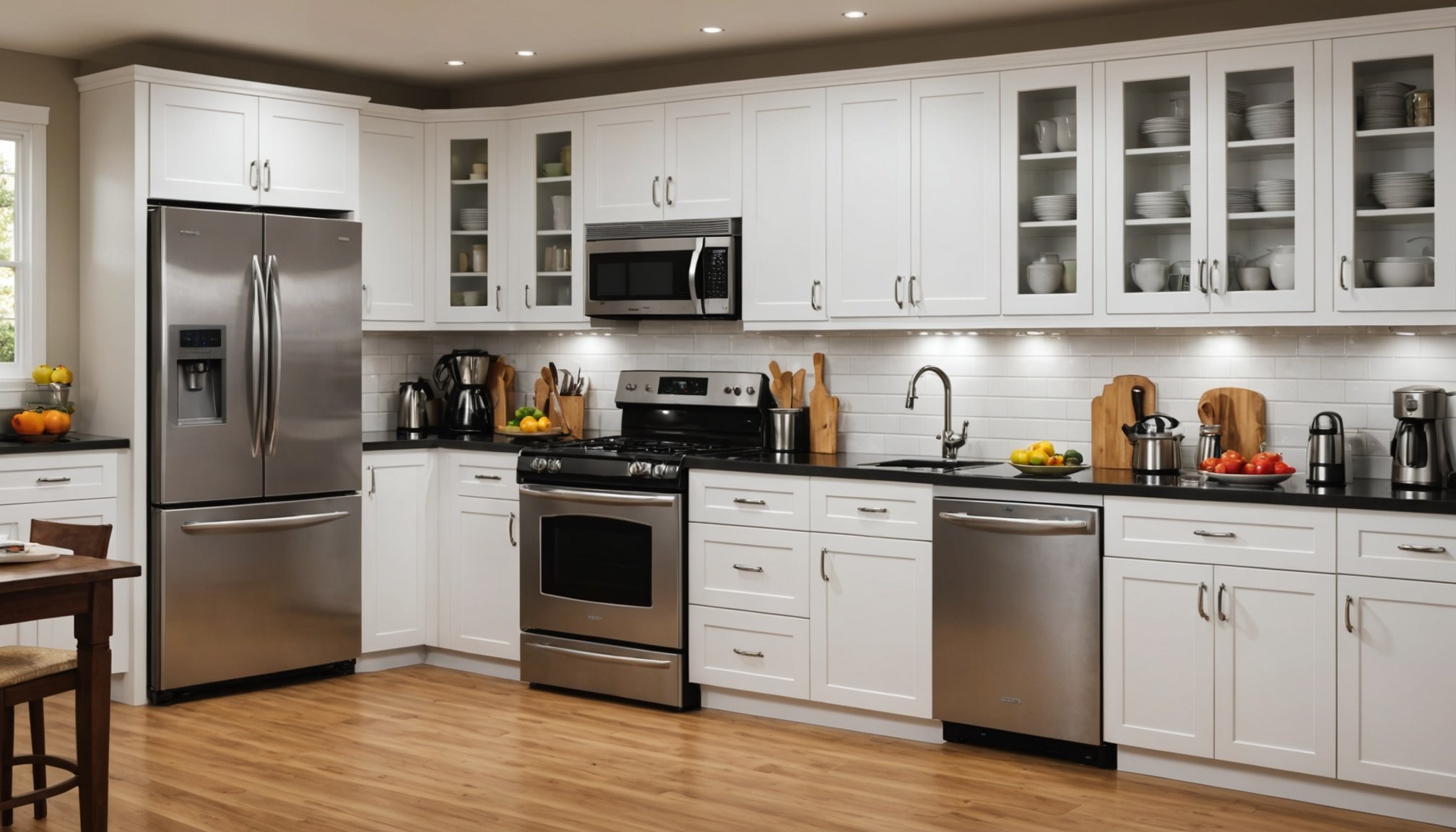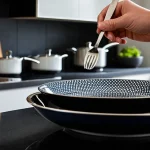Energy Efficiency
In today’s eco-conscious world, selecting energy-efficient kitchen appliances can significantly impact both your carbon footprint and your utility bills. Energy ratings, especially in the UK, are crucial as they determine the appliance’s energy consumption over time. Higher-rated appliances use less electricity, reducing your running costs and environmental impact.
When assessing appliances, consider key energy-saving features such as automatic shut-off, eco modes, and inverter technology. These features ensure optimal performance while conserving energy. Although energy-efficient models may have a higher upfront cost, the long-term savings on energy bills and their positive environmental impact often justify the investment.
Also to read : How can I leverage loyalty programs for UK kitchen savings?
Understanding UK energy ratings can guide you in choosing the most efficient models. Typically, appliances are rated on a scale from A to G, with A+++ being the most efficient. Prioritising these ratings can lead to substantial savings and a reduced carbon footprint. When purchasing, always weigh the initial price against the potential for long-term savings to make informed decisions that benefit both your wallet and the planet.
Size and Space Considerations
When it comes to planning your kitchen, ensuring that your kitchen appliances fit seamlessly into your available space is crucial. Start by assessing your kitchen’s layout to determine the ideal spots for appliances, considering factors like electricity and plumbing connections. Proper space planning helps avoid the common frustration of buying an appliance that doesn’t fit or function properly in your designated area.
Also to read : How do you compare prices for UK kitchenware to get the best deal?
Measuring for optimal fit involves taking precise dimensions of the width, height, and depth of the space where each appliance will reside. Pay special attention to the importance of clearance and door swing; this ensures that doors and drawers open fully without obstruction, allowing for unhindered access and maximum functionality. It’s vital to leave extra space around appliances for ventilation, which promotes better performance and prevents overheating.
By focusing on these aspects, you’ll create a harmonious kitchen environment that not only looks great but also enhances your cooking experience with perfectly fitted and functional appliances.
Functionality and Features
When choosing kitchen appliances, key functionalities should align with your culinary habits. For avid bakers, features like consistency in oven temperature and precise timers are essential. Busy families may prioritise dishwashers with quick cycles or ovens with multiple racks for efficient meal preparation.
Advanced technology adds convenience, elevating your cooking experience with smart appliances. These models connect to Wi-Fi, allowing you to control functions from your smartphone. For instance, a smart fridge can remind you of expiration dates or suggest recipes based on available ingredients, enhancing kitchen efficiency.
User-friendly features, such as intuitive control panels and easy-to-clean surfaces, improve everyday cooking. Consider induction hobs, which are safer and faster, and self-cleaning ovens for minimal maintenance. Selecting appliances with the right mix of functionality and technology ensures they meet your needs and simplify your cooking tasks.
Price and Budgeting
When budgeting for kitchen appliances, it’s essential to set a realistic figure considering both initial cost and long-term savings. Premium models may have a higher upfront price but can lead to cost savings with lower appliance energy consumption over time. Comparing different appliance options requires examining the cost-benefit ratio—factors include energy usage, durability, and advanced features.
To manage expenses effectively, take advantage of seasonal sales and promotions. In the UK, significant discounts often occur during Black Friday, end-of-season sales, and during January clearances. It’s wise to plan your purchases around these periods to maximise value. Additionally, assessing the value for money involves considering both the savings on energy bills and the longevity of the appliance, thus ensuring you get the best cost vs. value ratio.
Durability and Build Quality
When investing in kitchen appliances, examining the durability and build quality is imperative. Appliance lifespan is often determined by the quality of the materials used in manufacturing. Opting for appliances made from stainless steel or high-grade plastics can enhance longevity and ensure your appliance withstands regular use without significant wear.
Warranty periods provided by manufacturers often serve as a reliable indicator of durability. A longer warranty generally reflects the manufacturer’s confidence in the product’s longevity and performance. Thus, it’s crucial to compare the warranties offered by different brands before finalising a purchase.
The impact of brand reputation on the overall reliability of kitchen appliances cannot be overstated. Established brands often have a track record of producing reliable and well-built products. While newer entrants may offer innovative features at competitive pricing, their long-term durability might still be unproven. Therefore, thoroughly researching brand reputation and previous consumer experiences can guide you towards a trustworthy choice.
Brand Reputation and Reviews
Selecting the ideal kitchen appliance brands can be a daunting task given the plethora of options available in today’s market. It’s crucial to engage in thorough research to make informed decisions that will stand the test of time. Reputable consumer reviews offer valuable insights into appliance performance, reliability, and user satisfaction. Consulting reviews on established platforms allows potential buyers to compare experiences, providing a clearer picture of what to expect from specific models.
Trusted appliance manufacturers have a track record of delivering consistent quality and innovative features. These brands often invest in rigorous testing and quality control, ensuring their products meet high standards. Opting for well-known brands can mitigate risks associated with purchasing inferior products from less established manufacturers. Familiarity with brand reputation is fundamental; long-standing brands generally offer superior warranties and customer support, further enhancing their appeal.
However, dismissing new entrants entirely might cause consumers to miss out on potential innovations and competitive pricing. Exploring newer brands with a cautious approach may reveal options that combine modern technology with affordability. Ultimately, distinguishing between high-quality appliances requires balancing well-documented reliability and the opportunity to embrace fresh and potentially groundbreaking kitchen appliance offerings in the market.
Warranty and After-Sales Support
In the realm of purchasing kitchen appliances, understanding appliance warranties is paramount. A warranty often reflects the manufacturer’s confidence in the product’s durability and reliability. Look for warranties that cover both parts and labor, and consider those that offer extended coverage beyond the standard period. This coverage can prove invaluable, providing peace of mind and protection against unanticipated issues after purchase.
Customer service is another critical factor; the quality of after-sales support can significantly enhance your overall experience. Efficient service can simplify troubleshooting or repair processes, reducing hassle and ensuring appliance longevity. Initial impressions aside, robust customer service often includes timely assistance and readily available support channels, a hallmark of reputable UK retailers.
Comparing warranty options across different brands is crucial. Established brands typically offer comprehensive warranty plans, reflecting their assurance in product quality. On the other hand, while newer brands might present more innovative designs at competitive prices, their warranty offerings might not be as extensive. Therefore, thoroughly evaluating these aspects before deciding is beneficial, ensuring both protection and long-term satisfaction with your appliance purchases.
Where to Purchase
When it comes to purchasing kitchen appliances, deciding between online and brick-and-mortar stores can influence your overall buying experience. Online appliance retailers offer convenience and often have a wider selection of products. Shopping online allows for easier price comparison and the ability to read numerous reviews and specifications from the comfort of your home. Websites like AO.com and Currys provide extensive product information and customer feedback, aiding informed decisions.
On the other hand, visiting local appliance stores offers the advantage of physically assessing the appliances before buying. This tangible experience allows you to better evaluate the build quality and dimensions, ensuring a suitable fit for your kitchen space. Additionally, local stores frequently have knowledgeable staff available, providing expert advice and answering questions directly.
Whether purchasing online or from a physical store, it’s crucial to check return policies and delivery options. Return policies should be flexible, allowing for easy product exchanges or refunds if the appliance fails to meet expectations. Moreover, evaluate delivery costs and times; some UK retailers offer free or discounted delivery services, which can help reduce your purchase expenses. Consider these factors carefully to ensure a smooth and satisfactory appliance buying process.





